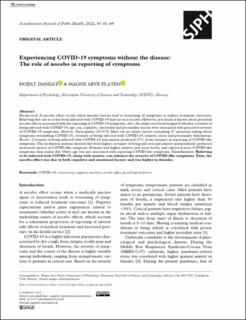Experiencing COVID-19 symptoms without the disease: The role of nocebo in reporting of symptoms
Peer reviewed, Journal article
Published version

Åpne
Permanent lenke
https://hdl.handle.net/11250/2989792Utgivelsesdato
2021Metadata
Vis full innførselSamlinger
- Institutt for psykologi [3143]
- Publikasjoner fra CRIStin - NTNU [38525]
Originalversjon
Scandinavian Journal of Public Health. 2021, 50 (1), 61-69. 10.1177/14034948211018385Sammendrag
Background:
A nocebo effect occurs when inactive factors lead to worsening of symptoms or reduce treatment outcomes. Believing that one is or has been infected with COVID-19 may act as a nocebo. However, not much is known about potential nocebo effects associated with the reporting of COVID-19 symptoms.
Aim:
An online survey investigated whether certainty of being infected with COVID-19, age, sex, cognitive, emotional and personality factors were associated with perceived severity of COVID-19 symptoms.
Methods:
Participants (N=375) filled out an online survey containing 57 questions asking about symptoms resembling COVID-19, certainty of being infected with COVID-19, anxiety, stress and personality dimensions.
Results:
Certainty of being infected with COVID-19 and anxiety predicted 27% of the variance in reporting of COVID-like symptoms. The mediation analysis showed that both higher certainty of being infected and anxiety independently predicted increased reports of COVID-like symptom. Females had higher anxiety and stress levels, and reported more COVID-like symptoms than males did. Older age was not associated with reporting COVID-like symptoms.
Conclusions:
Believing to be infected with COVID-19, along with anxiety, can enhance the severity of COVID-like symptoms. Thus, the nocebo effect was due to both cognitive and emotional factors and was higher in females.
